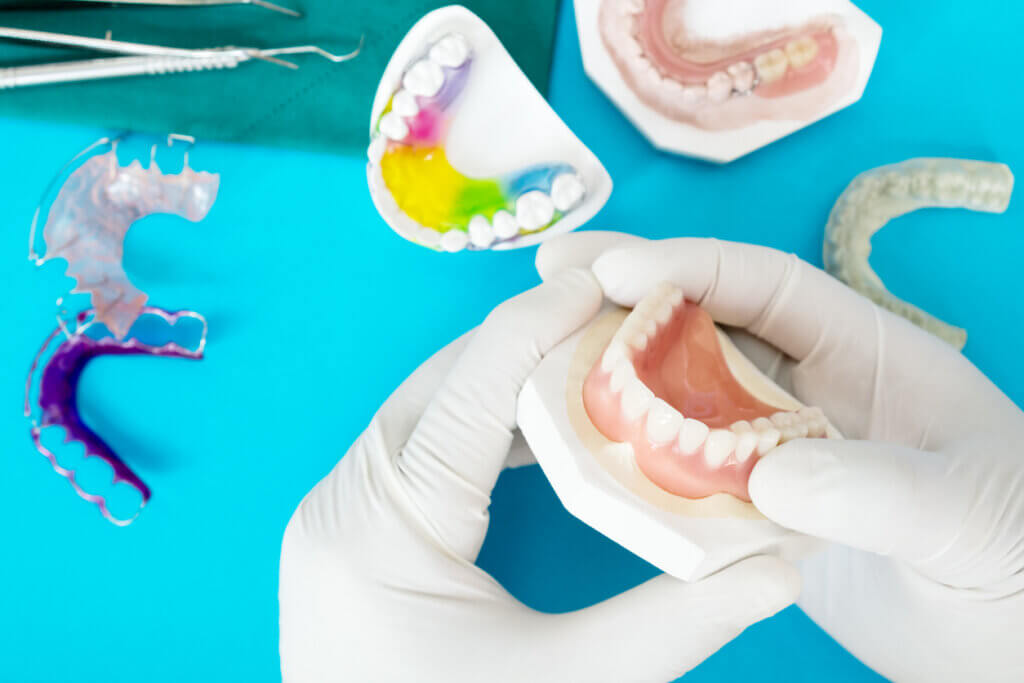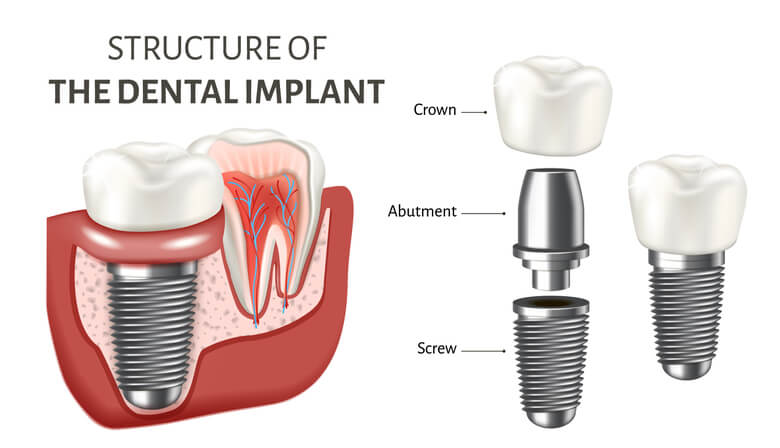Living with missing teeth can be a challenge. It can affect your ability to chew comfortably, slur your speech, and even impact your self-confidence. Fortunately, modern dentistry offers effective solutions to replace missing teeth. Since every patient is unique, with individual needs and preferences, at Beach Grove Dental in Tsawwassen, we offer a personalised approach to tooth replacement, providing consultations to discuss both dentures and dental implants for your missing teeth.
Consequently, we would like to explore the advantages and disadvantages of each option, helping you make an informed decision about the best path for regaining a complete and functional smile. Whether you’re a resident of Tsawwassen, South Delta, or the surrounding areas, Beach Grove Dental is here to help you smile with confidence again!
Table of Contents
ToggleUnderstanding Your Options: Dentures
Dentures are a removable appliance that replaces missing teeth. They are typically made of acrylic resin and can be either full dentures (replacing all teeth in an arch) or partial dentures (replacing some missing teeth).
Advantages of Dentures
While dentures may not be the perfect solution for everyone, they offer several advantages that make them a popular choice for tooth replacement:
Cost-Effective
Dentures are generally a more affordable option compared to dental implants. The upfront cost of dentures is significantly lower than dental implants. This can be a major advantage for patients on a budget or with limited dental insurance coverage. Additionally, denture repairs and adjustments are typically less expensive than some procedures that may be required for maintaining healthy dental implants.
Relatively Quick Procedure
Creating dentures is a faster process than dental implants. The process typically involves taking impressions of your mouth, creating a mold, and then fabricating the denture itself. Depending on the complexity of your case, the entire process can be completed in a few weeks. This can be a significant benefit for patients who want a quicker solution for replacing missing teeth and regaining a complete smile.
Non-Surgical and Minimally Invasive
Unlike dental implants, which require a surgical procedure to place the implant posts in the jawbone, traditional dentures do not involve any surgery. This can be a major advantage for patients who are apprehensive about surgery or have underlying health conditions that may make them ineligible for implant placement. Additionally, the process of creating and fitting dentures is minimally invasive, causing little to no discomfort for the patient.
Disadvantages of Dentures
Even though dentures offer several important advantages, it’s important to understand the potential drawbacks before making a decision. Here’s a closer look at some of the disadvantages of dentures:
Potential for Slipping and Discomfort
Traditional dentures rest on the gums and may slip or become loose over time, especially when eating or speaking. This can be embarrassing and uncomfortable, making it difficult to chew certain foods and speak clearly. Additionally, ill-fitting dentures can irritate the gums and cause sores. While adjustments and relines can help improve fit, they may be needed periodically.
Bone Loss and Reduced Bite Force
Missing teeth roots don’t stimulate the jawbone in the same way natural teeth do. Over time, this lack of stimulation can lead to bone loss in the jaw, which can affect the fit of dentures and even facial structure. Additionally, dentures may not provide the same biting force as natural teeth, making it difficult to chew certain foods. This can limit your dietary choices and potentially affect your overall nutrition.
Taste and Speech Limitations
Dentures can cover part of the roof of your mouth, which can affect your ability to taste certain foods. The presence of dentures in your mouth can also alter your speech patterns, making it difficult to enunciate clearly. While most people adjust to these changes over time, they can be a significant drawback for some denture wearers.
Considering Dental Implants
Dental implants offer a more permanent solution for missing teeth than replacing your teeth with dentures. Dental implants are small titanium posts surgically placed in the jawbone to act as artificial tooth roots. A crown, bridge, or denture is then attached to the implant for a natural-looking and functioning tooth replacement.
Advantages of Dental Implants
The initial investment for dental implants may be higher than dentures for replacing your missing teeth, however, they offer several significant advantages that make them a worthwhile long-term investment in your oral health and overall well-being:
Improved Function and Natural Bite Force
Dental implants fuse with the jawbone over time, mimicking the function of natural tooth roots. This provides a stable and secure foundation for the attached crown, bridge, or denture. Unlike dentures that can slip, implants allow you to chew and speak with confidence. You’ll be able to enjoy a wider variety of foods without worrying about discomfort or limitations. The restored bite force also improves overall oral health by allowing for proper food breakdown and digestion.
Durability and Longevity
Dental implants are built to last a lifetime with proper care. Unlike dentures that may need to be replaced every 5-10 years due to wear and tear, implants can last for decades. This translates to significant cost savings over time, as you won’t need to invest in replacements as frequently. Additionally, implants are highly resistant to chipping or breaking, making them a reliable and long-lasting solution for tooth replacement.
Preserves Jawbone Health
As mentioned earlier, missing teeth roots can lead to bone loss in the jaw. Dental implants prevent this by stimulating the jawbone in a similar way natural teeth do. This not only helps maintain facial structure but also creates a strong foundation for the implant itself and any surrounding teeth. Preserving jawbone health also contributes to improved overall oral health and reduces the risk of future dental problems.
Enhanced Appearance and Confidence
Dental implants are designed to look and feel very similar to natural teeth. The crowns or dentures attached to the implants are custom-made to match the color, shape, and size of your surrounding teeth, creating a natural and aesthetically pleasing smile. This can significantly boost your confidence and self-esteem, allowing you to smile, speak, and laugh without self-consciousness.
Disadvantages of Dental Implants
When considering dental implants, it’s also important to be aware of the potential drawbacks before making a decision. Here’s a closer look at some of the disadvantages of dental implants to consider:
Surgical Procedure and Healing Time
Unlike dentures, dental implants require a surgical procedure to place the implant posts in the jawbone. This can be a concern for patients who are apprehensive about surgery or have underlying health conditions that may make implant placement risky. Additionally, there is a healing period required after implant placement, typically several months, to allow the implant to fuse with the jawbone. During this time, you may need to wear temporary teeth and may experience some discomfort or swelling.
Higher Initial Cost
The upfront cost of dental implants is generally more expensive than dentures. This includes the cost of the surgical procedure, the implant posts themselves, and the attached crown, bridge, or denture. While the long-term cost-effectiveness of implants can be higher due to their durability, the initial investment can be a significant barrier for some patients. It’s important to discuss financing options with your dentist to see if there are ways to make implants more affordable.
Potential for Complications
As with any surgical procedure, there’s always a small risk of complications associated with dental implant placement. These can include infection, nerve damage, or sinus problems. While these risks are relatively low, it’s important to be aware of them before undergoing the procedure. Your dentist will perform a thorough evaluation of your oral health and discuss your medical history to determine if you’re a good candidate for implants and minimize any potential risks.
Choosing the Right Solution for You
A consultation with Dr Beeram at Beach Grove Dental can help you weigh the pros and cons of dentures and dental implants and determine the best option for your individual needs and preferences.
Here’s a quick comparison to help you decide:
| Feature | Dentures | Dental Implants |
| Cost | More affordable | More expensive |
| Procedure | Non-surgical | Surgical |
| Comfort | May slip or loosen | Feels natural |
| Durability | Can wear out over time and need refitting | Long-lasting |
| Bone Preservation | No | Yes |
| Eating and Speaking | May be limited | Natural function |
Schedule a Consultation with Dr Beeram Today!
If you’re missing teeth and considering your options for replacement, Dr Beeram at Beach Grove Dental in Tsawwassen can help! We offer a personalized consultation to discuss your needs, answer your questions, and help you choose the best tooth replacement solution for you.
Don’t live with the limitations of missing teeth any longer. Contact Beach Grove Dental today at 604-330-1163 or book a consultation online to restore your smile and regain your confidence!


